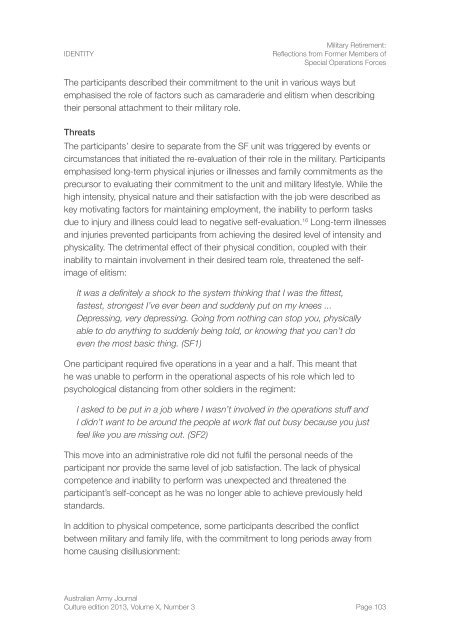Australian Army Journal
Australian Army Journal
Australian Army Journal
Create successful ePaper yourself
Turn your PDF publications into a flip-book with our unique Google optimized e-Paper software.
IDENTITY<br />
Military Retirement:<br />
Reflections from Former Members of<br />
Special Operations Forces<br />
The participants described their commitment to the unit in various ways but<br />
emphasised the role of factors such as camaraderie and elitism when describing<br />
their personal attachment to their military role.<br />
Threats<br />
The participants’ desire to separate from the SF unit was triggered by events or<br />
circumstances that initiated the re-evaluation of their role in the military. Participants<br />
emphasised long-term physical injuries or illnesses and family commitments as the<br />
precursor to evaluating their commitment to the unit and military lifestyle. While the<br />
high intensity, physical nature and their satisfaction with the job were described as<br />
key motivating factors for maintaining employment, the inability to perform tasks<br />
due to injury and illness could lead to negative self-evaluation. 16 Long-term illnesses<br />
and injuries prevented participants from achieving the desired level of intensity and<br />
physicality. The detrimental effect of their physical condition, coupled with their<br />
inability to maintain involvement in their desired team role, threatened the selfimage<br />
of elitism:<br />
It was a definitely a shock to the system thinking that I was the fittest,<br />
fastest, strongest I’ve ever been and suddenly put on my knees ...<br />
Depressing, very depressing. Going from nothing can stop you, physically<br />
able to do anything to suddenly being told, or knowing that you can’t do<br />
even the most basic thing. (SF1)<br />
One participant required five operations in a year and a half. This meant that<br />
he was unable to perform in the operational aspects of his role which led to<br />
psychological distancing from other soldiers in the regiment:<br />
I asked to be put in a job where I wasn’t involved in the operations stuff and<br />
I didn’t want to be around the people at work flat out busy because you just<br />
feel like you are missing out. (SF2)<br />
This move into an administrative role did not fulfil the personal needs of the<br />
participant nor provide the same level of job satisfaction. The lack of physical<br />
competence and inability to perform was unexpected and threatened the<br />
participant’s self-concept as he was no longer able to achieve previously held<br />
standards.<br />
In addition to physical competence, some participants described the conflict<br />
between military and family life, with the commitment to long periods away from<br />
home causing disillusionment:<br />
<strong>Australian</strong> <strong>Army</strong> <strong>Journal</strong><br />
Culture edition 2013, Volume X, Number 3 Page 103

















